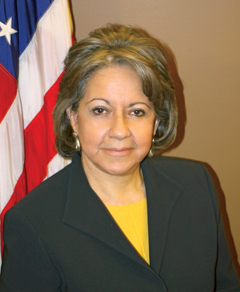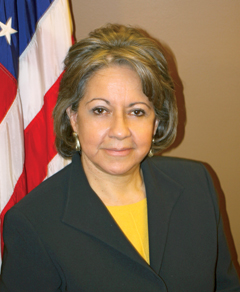

Athena Award finalist: Marguerite Salazar
Maria Cote //May 1, 2012//

Ask Marguerite Salazar if her career has ever felt like a burden over the years, and she laughs.
Yes, she’s fought tirelessly for the rights of some of our country’s poorest citizens. And yes, sometimes it’s been difficult to shovel through piles of paperwork and plead her case.
But the payoff is priceless, says the regional director of the U.S. Department of Health and Human Services. Before taking her job as director in May 2010, she served as president and CEO of Valley-Wide Health Systems Inc., in Alamosa for more than 21 years.
“It’s been incredibly rewarding work,” Salazar says. “When we took care of migrant workers in the San Luis Valley, you couldn’t find patients who were more gracious and grateful.
“I’d tell the doctors when they started working with these people, you’ll look in the clinic in the morning and it will be full of cantaloupe or lettuce. They find ways to thank you.”
It started with just three clinics, Salazar says. From there, the need grew, and when she left, 26 clinics were serving the community.
Working in a rural community had many rewards, says the Athena Award finalist.
“You’ll have bankers living next to farm workers, and everyone is fine with that,” she says. “I’ve never subscribed to the idea of separate clinics for the wealthy and the not-so-wealthy.”
The line between the “haves” and the “have-nots” becomes incredibly fine, she says, when those with health insurance reach a health cap.
“You have someone who is in treatment, and they run into trouble when they get cancer and they reach their cap,” she says. “That we’re not able to provide care to everyone in this country is amazing to me.”
In her role at the government agency, she continues to speak out for the medically underserved populations of Colorado, addressing disparities in both short- and long-term health care.
She also addresses the needs of 28 tribes and the 40,000 urban Indians residing in Denver through the Indian Health Improvement Act.
Olga Garcia, who nominated Salazar for the Athena Award, got to know her through the National Hispana Leadership Institute. Garcia, also a graduate of the institute, says her friend has tremendous compassion for the underserved communities.
“She’s made helping them her life’s work,” Garcia says. “She’s a strong person to be able to stand up to the criticism surrounding the Affordable Care Act, but she’s determined and works tirelessly.”
Salazar, 58, says she feels blessed to live in a time when health-care reform is making strides.
“And I was born at a time when women have been able to achieve such great things,” she says. “I was often the only woman at the table at work, and now we’re seeing more and more younger women.
“But we have to remember that these things didn’t happen overnight. We have to be vigilant and not just sit back and say, ‘All is good.’ We have to pay attention and be sure that women continue to achieve great things.”
























